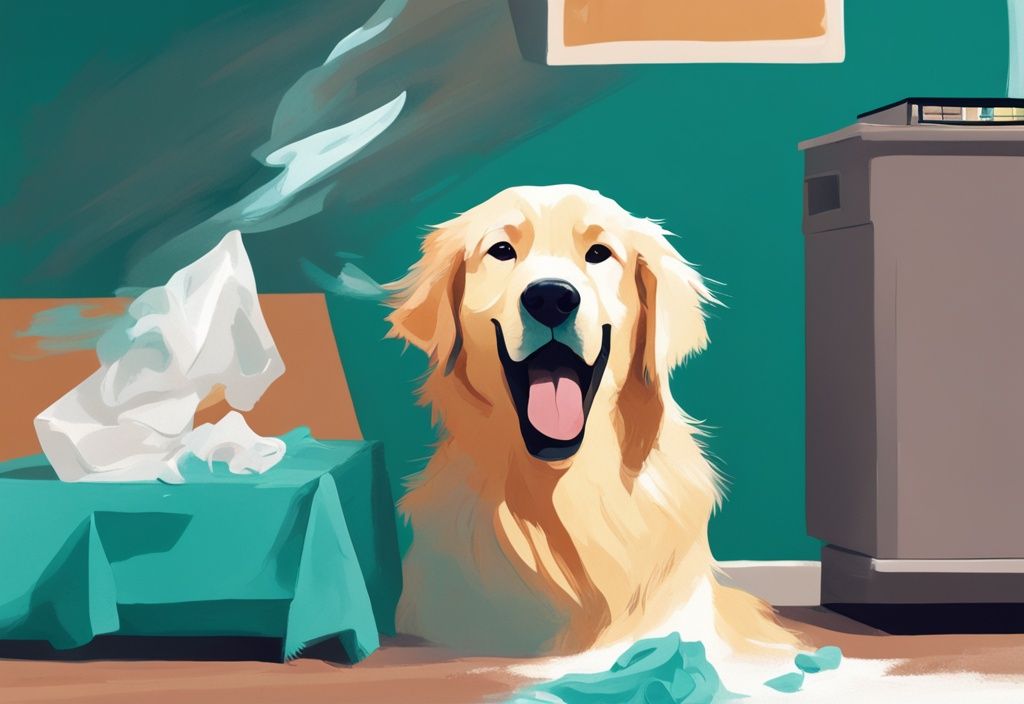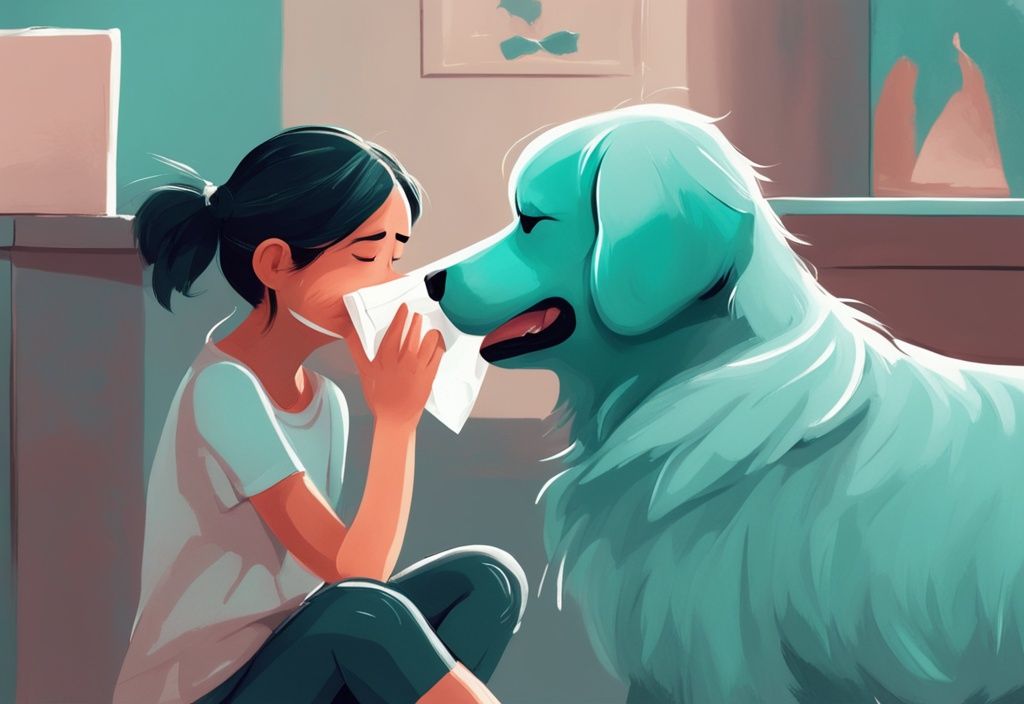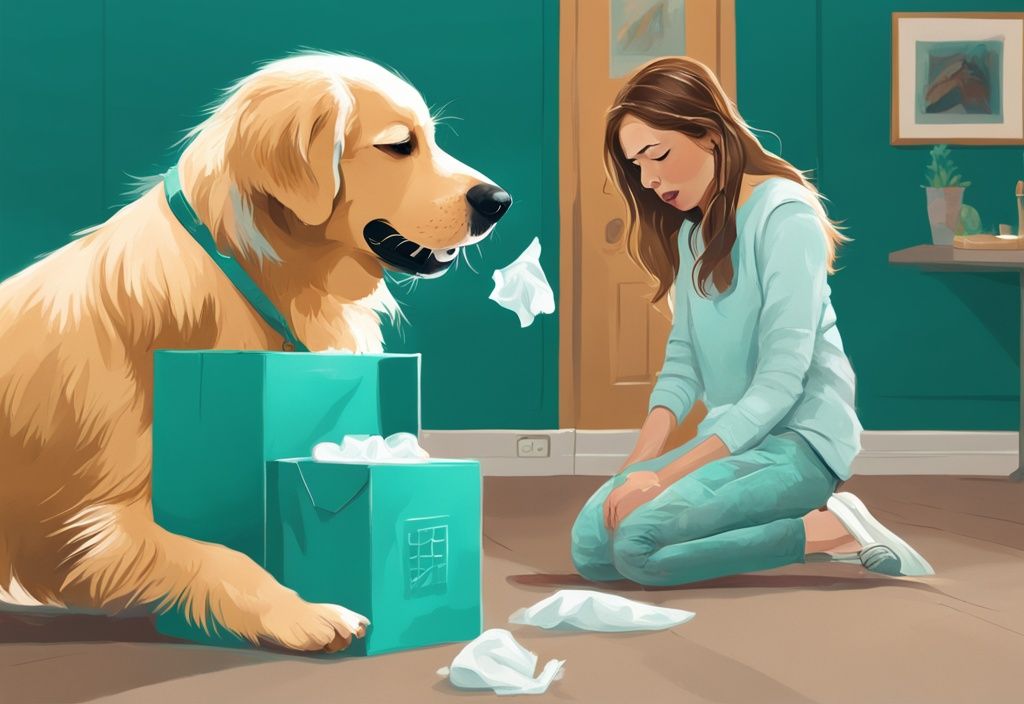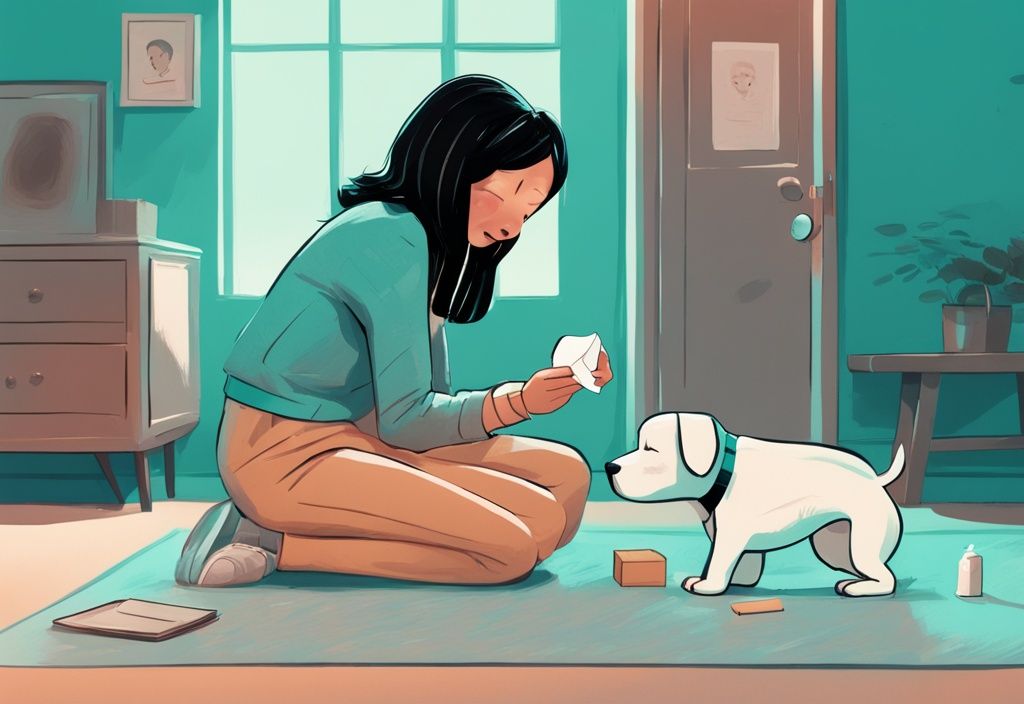Ever braced for a doggy sneeze and wondered why my dog keeps sneezing? You’re not alone! Much like Max, my sprightly Border Collie, loves to surprise me with a sneeze or two during our playtimes. Sure, it might seem perplexing, but sneezing in dogs can range from benign to a red flag.
Diving headfirst into the canine world of sneezes, this article unravels common triggers and what they signify. Now, wouldn’t you love being the Sherlock to your furry Watson’s sneeze mystery? So hang in there as we decode the when, why, and how of doggy sneezes together, guiding you on when it’s time to ring up the vet. Let’s embark on this sneeze-tastic journey for the well-being of our loyal companions.
Why Dogs Sneeze: An Overview
Sneezing is an important reflex for dogs, purging their nasal passages of irritants. If you’re curious about why ‘my dog keeps sneezing,’ multiple factors could be at play. Let’s dive into the various reasons behind this frequent doggy reflex.
Firstly, dogs sneeze when foreign materials invade their nose—think dust, pollen, or small particles picked up during their curious adventures. This simple sneeze mechanism helps to kick these intruders out, keeping their nasal passages nice and clear.
Allergens are another usual suspect. Dogs, much like us, can react to pollen, dust mites, mold, and even specific foods. Faced with such allergens, their go-to response is sneezing, trying to boot out those pesky particles. And let’s not forget infections—bacterial or fungal irritants can agitate the nasal mucosa and trigger sneezing as a defense.
Interestingly, sneezing can also be part of your dog’s social life. When Max, my Border Collie, gets overly excited during play, he signals his enthusiasm (and peace) through brief, harmless sneezes. It’s like his way of saying, “I’m just having fun here!”
It’s essential to distinguish casual sneezing from frequent, severe bouts. Say my dog keeps sneezing persistently—that’s a red flag, pointing to potential underlying health problems. Chronic sneezing could be an alarm bell for infections, nasal tumors, or even dental issues, all requiring professional vet care.
Understanding these finer details can help you nurture your dog better, ensuring that an innocent sneeze doesn’t mask a deeper problem. After all, taking care of our furry friends is a joyous journey we embark on together.
Normal vs.
En este video, aprenderás sobre las causas de los estornudos en los perros y cuándo es necesario consultar a un veterinario, especialmente si tu perro estornuda con frecuencia.
Concerning Dog Sneezing
Normal Sneezing: When my dog, Max, keeps sneezing occasionally, it’s often because of minor irritants like dust or small particles. Imagine it like when you walk into a room and catch a whiff of pepper – a quick sneeze to clear it out, and you’re back to normal. These little sneezes can also pop up when dogs are having a blast, whether during a bout of play or when they’re super excited. Typically, this kind of sneezing is here and there, without tagging along with other symptoms like nasal discharge or that oh-so-funky lethargy. Just a natural reflex to shoo those pesky irritants away. So, no need to worry – it’s just part and parcel of being a doggo.
Concerning Sneezing: Now, there are moments when frequent and severe sneezing sends me into worry mode. If Max starts sneezing constantly and with gusto, it could signal something more serious that needs the vet’s attention. Watch out for concerning signs like non-stop sneezing, nasal discharge (whether it’s clear, bloody, or mucoid), coughing, or wheezing. Plus, if your furry friend seems lethargic, loses their appetite, or shows other signs of illness, it’s time to grab that vet’s number. These symptoms can hint at infections, allergies, or even a foreign object causing a ruckus in the nasal passages. Getting it checked out pronto ensures your pup’s snout is back to sniffing in no time.

Causes of Frequent Sneezing in Dogs
Understanding why your dog keeps sneezing can help you take action and ensure your furry friend stays happy and healthy. Let’s dive into some common causes, from environmental irritants to dental issues.
Environmental Allergies and Irritants
Is your dog sneezing non-stop? Well, just like humans, dogs can be sensitive to environmental allergens. When your dog keeps sneezing, it might be due to inhaling everyday irritants like pollen, dust, mold spores, smoke, or those strong-smelling chemical cleaners around the house. Just imagine how annoying that could be!
Such environmental factors irritate the nasal passages, leading to symptoms like persistent sneezing, watery eyes, scratching, and even coughing. If you’re interested in learning more about keeping your dog healthy, consider reading our Badlands Ranch dog food review for some dietary insights. And don’t forget those seasonal triggers like plant pollen that can really ramp up the sneezes, especially after a day out in the park.
Reducing your dog’s exposure to these irritants can work wonders in alleviating sneezing and keeping them comfortable; for more information on managing environmental allergies in dogs, check out this resource on environmental allergies in dogs. Perhaps consider air purifiers or hypoallergenic cleaning products?
Food Allergies: An Unexpected Sneezing Trigger
Did you know that food allergies can also make your dog keep sneezing? It’s not as common, but it happens. Along with sneezing, dogs with food allergies might show other signs like skin infections, incessant itching, or tummy troubles.
If you suspect food is the culprit, a vet may suggest an elimination diet to identify the specific allergen. This methodically removes potential troublemakers from their diet and slowly reintroduces them to see which one is causing the allergic reaction.
This detective work can significantly cut down on sneezing and make your pup’s life much smoother.
The Danger of Foreign Bodies
Sometimes, sneezing can be due to foreign objects getting stuck in your dog’s nose. Little things like grass seeds, foxtails, or small sticks can become lodged inside, causing continuous sneezing and a whole lot of discomfort.
If you notice that your dog keeps sneezing uncontrollably, it’s important to get them checked out by a vet ASAP. Quick removal of these pesky invaders is crucial to prevent infections or damage to the nasal passages.
Your vet can safely remove the foreign object and provide any needed follow-up care. It’s always better to be safe than sorry!
Nasal Infections: The Sneezing Phenomenon Explained
Could it be a nasal infection? When your dog keeps sneezing, nasal infections caused by bacteria or fungi might be at play. Look out for thick or bloody nasal discharge, fever, lethargy, and swelling around the nose added to the mix.
Early intervention by a veterinarian is key here. Proper antibiotics or antifungal treatments can tackle the infection, reducing sneezing and helping your dog bounce back quickly. Swift veterinary care makes sure the infection doesn’t escalate into something nastier.
When Dental Problems Cause Sneezing
Ever thought that dental issues could cause sneezing? Yep, problems like dental abscesses, decayed teeth, or gum infections can inflame the nasal passages, making your dog keep sneezing.
If there’s no other obvious cause, a dental check-up might reveal the sneezing culprit hiding in plain sight. Regular dental care is super important in preventing these sneaky issues. So, don’t forget those dental check-ups and cleanings. Your dog’s nose and teeth will thank you!
Reverse Sneezing: What is it?
Reverse sneezing might sound strange, but it’s more common than you think. It happens when your dog rapidly inhales, making a snorting sound that can be mistaken for choking or breathing difficulties. Often triggered by excitement, irritants, or even harness pressure, it’s usually harmless and short-lived.
When your dog keeps sneezing like this, calming them down or gently massaging their throat can help. However, if these episodes become frequent, a vet visit is a good idea to rule out any underlying issues.
Remember, paying attention to these sneezing signs ensures your dog stays happy, healthy, and carefree!

When to Seek Veterinary Help for Your Dog’s Sneezing
Is your furry friend sneezing up a storm? It might be more than just a tickle in the nose. Persistent sneezing in dogs can sometimes signal more serious health issues. Let’s dive into what to watch out for and when it’s time to get your pup to the vet.
Symptoms That Indicate Emergency
If your dog keeps sneezing and also shows any of the following symptoms, it’s a good idea to make that vet appointment pronto:
- Discharge: Notice any nasal discharge that’s bloody or thick? This can mean severe infections or foreign bodies stuck in the nasal passages.
- Lethargy: Is your pup unusually tired and lacking energy? Persistent lethargy could indicate a more systemic issue rather than just an annoying irritant in the nose.
- Loss of Appetite: If your dog is sneezing and suddenly shows no interest in its food bowl, it could be in discomfort or dealing with a more generalized illness. Time to seek veterinary advice.
- Fever: Check for fever signs, like a warm nose or ears, shivering, or general weakness. Fever often means an infection that needs medical attention.
- Severe Nasal Swelling: Swelling around the nose area can indicate trauma, foreign bodies, or severe infections. Immediate vet consultation is crucial to figure out what’s going on.
- Rapid Escalation of Symptoms: Are the sneezing symptoms worsening quickly without any clear cause? This can point to a serious condition needing urgent vet evaluation.
Guide to Recognizing Unusual Behaviors in Sneezing Dogs
It’s not just about the sneezes! Pay close attention to your dog’s behavior to figure out if there’s a deeper issue lurking beneath those cute, yet persistent, “achoo” noises:
- Behavioral Changes: Is your usually cheerful dog acting grumpy or reluctant to join in regular activities? Sudden shifts in behavior could be signs of distress or illness.
- Correlation with Environment: Notice any patterns with environmental factors? If sneezing spikes after playing in the backyard or lounging in a particular room, it might be related to allergens like dust or pollen.
- Dietary Links: Changed your dog’s food lately? If sneezing started after introducing new treats or meals, it could be a food allergy. This info helps the vet pinpoint the issue.
- Physical Symptoms: Besides the sneezes, look for other symptoms like scratching, watery eyes, or nasal discharge. Any new environmental or dietary factors? These help paint an accurate picture of your dog’s health.
By keeping a keen eye on these behaviors and symptoms, you can share valuable insights with your veterinarian. This helps in crafting a swift and accurate diagnosis, ensuring your beloved pooch remains happy, healthy, and full of tail-wags. Remember, timely vet visits can make all the difference!
Home Remedies to Help Your Sneezing Dog
When your dog keeps sneezing, finding effective home remedies can improve their comfort and well-being.
Easy-to-Follow Prevention Tips for Dog Sneezing
If you find yourself constantly thinking, “My dog keeps sneezing,” it’s time to act! Keeping your furry friend’s environment spick and span is a game-changer. Regular vacuuming and dusting can zap those pesky allergens like dust and dander. Ever thought about an air purifier? They work wonders in snatching airborne particles, and good ventilation helps keep mold and pollen at bay.
Don’t forget about your dog’s cozy corner. Their bedding can be a sneezing hotspot if not cleaned regularly. Toss that bedding in the wash to banish accumulated dust and dander. Also, keep an eye on their diet. Switching to hypoallergenic food might be the key if you suspect food allergies are causing those sneezes. Notice how different foods affect your pooch, and you’ll be on your way to a sneeze-free pup.
Grooming to Reduce Sneezing: Do’s and Don’ts
Grooming is another puzzle piece in the “my dog keeps sneezing” conundrum. Brushing Fido regularly helps whisk away loose hair and dander, which can otherwise tickle their nasal passages. Plus, it keeps their coat looking fab and their skin healthy.
Bathing can be a breath of fresh air too! Occasional baths with hypoallergenic shampoos minimize allergens on their fur and skin. Just steer clear of those heavily scented products—they might smell good to you, but they can turn your dog’s sneezes into a storm due to added chemicals that irritate their nasal passages.
By sticking to these grooming do’s and don’ts, you can significantly cut down on your dog’s sneezing from irritants. A clean, allergen-free grooming routine is a ticket to a happy, comfy, and healthy pup.
Dog Sneezing: The Role of Professional Veterinary Care
When you notice that your dog keeps sneezing frequently, a veterinary consultation may be essential to identify the underlying issue. A thorough examination by the vet often involves a few standard procedures to determine the cause of persistent sneezing.
Predicting Your Visit to the Vet: Procedures and Treatments
Firstly, the vet will likely perform a comprehensive physical examination. This initial assessment helps to identify obvious signs of infection, allergies, or other physical abnormalities. If needed, more specific diagnostic tests will follow. For those dealing with shedding pets, here’s some advice on how to get dog hair out of the car.
Diagnostic tests may include bloodwork. Blood tests can reveal infection markers, immune system activity, and other vital data that could indicate the nature of the problem causing your dog’s sneezing.
Next, the vet might suggest X-rays or imaging studies. These can help visualize the nasal passage and sinuses, identifying issues like tumors, foreign bodies, or structural abnormalities. Imaging is particularly useful when initial examinations and bloodwork do not reveal the problem.

In some cases, a nasal endoscopy is necessary. This procedure involves using a small, flexible camera to directly view the inside of your dog’s nasal passages and sinuses. It allows for the detection of smaller or more hidden issues, such as minor foreign bodies or fungal growths. If you’ve noticed changes in your aging pet’s appetite, you might be wondering, why is my senior dog not eating.
After identifying the cause of frequent sneezing, the vet will develop a treatment plan. This plan may vary considerably depending on the diagnosis:
- Antibiotics: If a bacterial infection is present, antibiotics will be prescribed to eliminate the bacteria and reduce the inflammation causing the sneezing.
- Antifungal Medications: For fungal infections, specific antifungal treatments will be necessary to target the infection.
- Antihistamines: For dogs suffering from allergies, antihistamines can help manage sneezing and other allergic reactions.
- Surgical Intervention: In situations where sneezing is caused by foreign bodies, tumors, or structural issues, surgical procedures may be required to remove the obstruction or correct the abnormality.
Follow-up visits are crucial to ensure the effectiveness of the treatment and to adjust it if necessary. Regular monitoring helps in managing the overall health and well-being of your dog, preventing the recurrence of symptoms and addressing any new issues promptly.
If your dog keeps sneezing, don’t hesitate to seek professional veterinary care. Proper diagnosis and timely treatment are key to ensuring a happy, healthy life for your furry friend.
Conclusion
If you’re wondering why my dog keeps sneezing, it’s important to know that frequent sneezing in dogs can range from harmless behaviors to signs of more serious health issues. This natural reflex helps expel irritants from the nasal passages but can also indicate underlying conditions that require attention.
Understanding the causes behind why my dog keeps sneezing involves recognizing the difference between normal sneezing and concerning sneezing. Normal sneezing may occur sporadically due to minor irritants like dust or excitement and usually isn’t accompanied by other symptoms. On the other hand, concerning sneezing is more frequent, severe, and may come with symptoms like nasal discharge, coughing, and lethargy. Such cases necessitate a veterinary consultation to ensure your dog receives the appropriate care.
Environmental factors and allergens are common triggers for sneezing. Your dog might react to pollen, dust, mold, or smoke, and it’s essential to mitigate these within their environment. For instance, after playing outdoors, dogs may sneeze more due to increased exposure to plant pollens. Regular grooming and maintaining a clean living space can significantly reduce the chances of these environmental irritants causing issues.
Food allergies are a lesser-known cause but can still be a culprit behind why my dog keeps sneezing. Alongside sneezing, food allergies might bring about skin infections, itching, or gastrointestinal discomfort. An elimination diet can help identify the specific allergen, improving your dog’s overall health.
In addition to allergens, foreign bodies lodged in a dog’s nasal passage, nasal infections from bacteria or fungi, and dental problems can also lead to persistent sneezing. Immediate veterinary attention is crucial in these scenarios to prevent further complications and ensure effective treatment.
Do not overlook reverse sneezing, a common phenomenon where a dog makes snorting sounds and appears to struggle with breathing. Although typically harmless and resolvable by calming the dog, frequent episodes should still be discussed with your vet.
Given the range of potential causes, it’s vital to know when to seek veterinary help. Symptoms such as bloody or thick nasal discharge, fever, and loss of appetite alongside persistent sneezing should prompt urgent consultation.
To keep your dog healthy and minimize sneezing, focus on preventive measures. Regular grooming to reduce shedding and dander, maintaining a clean environment, and monitoring dietary changes are all crucial. By understanding the reasons behind why my dog keeps sneezing and acting promptly when needed, you can ensure your furry friend remains happy and comfortable.
Frequently Asked Questions about Dog Sneezing
Let’s dive into some of the most common questions dog owners have about their furry friends’ sneezing habits. Whether you have a playful pup or a senior hound, understanding why dogs sneeze can help you ensure your pet stays healthy and happy.
Why may your dog sneeze mainly after going outdoors?
Imagine my Border Collie, Max, sprinting through the park, nose close to the ground, sniffing every blade of grass. Exposure to seasonal allergens like pollen, or environmental irritants such as dust and mold, can easily make Max sneeze when he gets home. These elements often tickle their nasal passages, leading to those amusing—yet sometimes concerning—sneezing episodes.
How is your dog’s sneezing related to their diet?
Food allergies aren’t always about itchy skin or upset tummies. They can sometimes be the sneaky culprits behind constant sneezing. If I notice Max sneezing more than usual, I consider whether an undiagnosed food allergy might be the issue. An elimination diet can help pinpoint the offending ingredient.
Can reverse sneezing be dangerous for your dog?
Reverse sneezing can sound pretty alarming, but it’s usually harmless and goes away quickly. However, if Max keeps reverse sneezing, I know it’s time to visit the vet. Better safe than sorry, right? It’s best to rule out any underlying issues causing frequent episodes.
How can you tell if your dog’s sneezing is due to a serious issue?
Thick or bloody discharge, along with lethargy, loss of appetite, and breathing difficulties, are red flags. If Max shows these symptoms alongside sneezing, a trip to the vet is non-negotiable. Spotting these signs early can make all the difference for our furry friends.
Are certain dog breeds more prone to sneezing?
Brachycephalic breeds, like Pugs, Boston Terriers, and English Bulldogs, often have compressed nasal passages that make them sneeze more frequently. If Max were one of these breeds, his unique nasal structure would likely be the reason behind his frequent sneezes. Understanding this helps tailor care to their specific needs.
